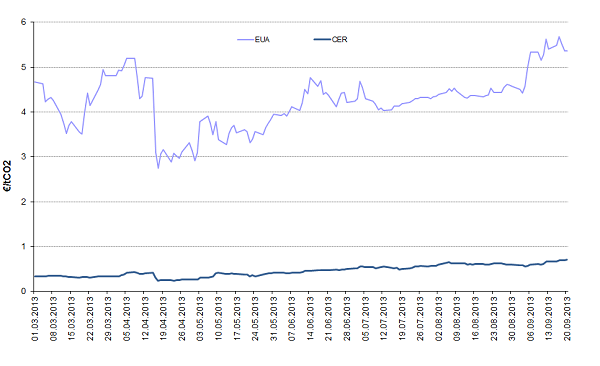French carbon tax, feed-in tariff reform and CCS on horizon
The week in clean energy – German election provides clean energy clues, EPA says CCS not impossible
Last weekend saw a big win for Angela Merkel, but will clean energy have anything to gain from the Chancellor’s re-election victory?
This is the question many renewable energy investors are considering this week following the victory of Merkel’s right-of-centre grouping in Sunday’s German election.
Merkel and her Christian Democratic Union (CDU), along with sister party the Christian Social Union (CSU), narrowly missed an absolute majority in the federal election, but are now without a coalition partner. The CDU’s former coalition party, the Free Democratic Party (FDP), failed to reach the 5% hurdle needed to win seats in the Bundestag.
Bloomberg New Energy Finance expects it will take weeks for a new coalition to be formed, with the Social Democrats (SPD) or Germany’s Green Party potentially joining forces with the CDU. Both parties are more supportive to renewables than the previous coalition partner, the FDP.
The reform of the Erneuerbare-Energien-Gesetz (EEG) will become a priority once a coalition is formed. The EEG, Germany’s 13-year-old renewable energy act, is designed to increase the share of electricity from green sources to 80% by 2050, from about 23% now.
Under the EEG, the government guarantees above-market prices for wind, biomass and solar power generators. The difference between the rate paid to clean-energy producers, which get priority access to the grid, and the market price, is offset by a charge added to every household bill.
In 2013, the EEG surcharge increased 47% to EUR 0.528/kWh. While there are many factors contributing to this spike, direct support to renewables has taken most of the blame.
Bloomberg New Energy Finance anticipates that the new coalition will rebalance the cost distribution for renewable support in a way that will help alleviate the burden on households. Energy-intensive industries are currently granted exemptions from paying the EEG surcharge. Bloomberg New Energy Finance expects that some but not all of these exemptions will disappear, as both the CDU-CSU and the SPD parties have strong ties to industrial lobbies.
Meanwhile, all carbon market participants will be waiting to hear the new coalition’s position on a draft plan to fix an oversupply in the region’s emissions-trading system.
Germany’s neighbour France is also looking to shake up how it supports renewables as the country begins its “energy transition” away from nuclear.
France will introduce a carbon tax and a law to cap nuclear-power capacity as part of a new energy bill next year to boost renewable generation, President Francois Hollande told an environment conference last week. Hollande has vowed to reduce reliance on nuclear to half of total output by about 2025 while also keeping down consumers’ bills.
Among other things, the energy law in 2014 will define how renewables are financed. Hollande said last week that the above-market guaranteed prices currently paid to green energy producers “can lead to a waste of public funds, profit-taking and speculative behaviour.” Bloomberg New Energy Finance expects the shift in renewable support may move towards a greater use of tenders to keep costs low.
Over in the US, the Environmental Protection Agency (EPA) announced a plan for limiting emissions from new coal-fired power plants. The new draft rules place a limit of 1,100 pounds of carbon dioxide for each megawatt hour of power produced – a standard that no coal-fired power plant can meet without carbon-capture technology, EPA administrator Gina McCarthy said 20 September in remarks prepared for delivery at the National Press Club in Washington.
In proposing these limits, the EPA is effectively saying that carbon capture and storage (CCS) is feasible, even though the technology is not yet being used on a commercial scale. The agency is implicitly challenging coal interests to demonstrate otherwise.
The EPA’s move sets the stage for a far-reaching set of final rules governing emissions from existing power plants, due by June 2014. McCarthy has said those rules will not require existing coal-fired power plants to install CCS equipment.
There were also big clean energy deals last week. Landis Gyr won a GBP 600m (USD 956m) contract to supply smart meters in the UK, while Vestas Wind Systems said 20 September it received an order to supply turbine equipment with a capacity of 60MW to Renewable Energy Systems Americas in a deal that could grow to as much as 610MW in 2014 and 2015. Vestas shares closed the trading week 3.3% up.
The Danish wind turbine maker was just one of many other clean energy stocks that ended the week on a positive note. The Wilderhill New Energy Global Innovation Index, or NEX, that tracks 98 clean energy companies, closed last week 2.9% up, beating broader market indexes.
The week in carbon markets – EU CO2 slips; German power lost might
European Union allowances (EUAs) for December 2013 lost 0.9% last week, ending last Friday’s session at EUR 5.36/t on ICE Futures Europe exchange in London. German power for delivery in 2014 had its first weekly loss in over a month, ending Friday’s session at EUR 38.60/MWh, a 2.0% decrease on the previous week’s EUR 39.40/MWh close. EU nations may decide after the elections in Germany on a European Commission plan to reduce an oversupply of permits by temporarily delaying the sale of 900Mt of allowances through 2015. UN Certified Emission Reduction credits (CERs) for December 2013 increased EUR 0.04/t. last week to close at EUR 0.71/t.
Carbon prices – EUAs and CERs

Note: As of 21 Dec 2012, benchmark prices are for Dec-2013 contracts
Source: Bloomberg New Energy Finance
This article was originally published by Bloomberg New Energy Finance. Republished with permission.













